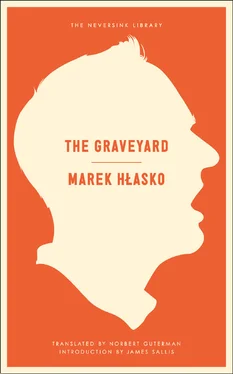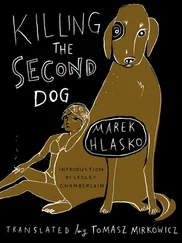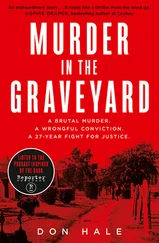“Speak up,” the district delegate said.
“Speak up,” Pawlak said.
“Speak up,” Blizniaczek said simultaneously with the Second Secretary.
“Well, I am speaking,” said Gierwatowski. “Is it true that peoples come from monkeys?”
“ People , not peoples , Comrade Gierwatowski,” Blizniaczek corrected him.
“What?”
“People.”
“That’s what I am saying: peoples.”
“Just a moment,” the district delegate said; his eyebrows had returned to their initial position. “In just what connection are you asking this?”
“Well, how can it be? Peoples from monkeys?”
“What of it?”
Gierwatowski grew red with anger. “My son comes to me and says, ‘Daddy, is it true that peoples come from monkeys?’ ‘Clear out, you little squirt,’ I say to him, ‘or I’ll give you a kick in the ass that’ll make you forget your monkeys. Back to your homework.’ ‘But that’s what they’re teaching,’ he says. ‘It’s in the book; it really is.’ ‘Where?’ I say. ‘It’s a long time since you’ve been spanked.’ ‘Here,’ he says. I pick up the book, I read, and I can’t believe my eyes. I read, and I think, Have I gone nuts in my old age? Or has the fellow that printed this gone crazy? That’s what it says in the book — from monkeys, and that’s all there is to it. I hit the brat over the head, and on Sunday I went to the zoo myself.” He paused.
“Well?”
“Is it possible?”
“Is what possible?”
“That we come from monkeys?”
Blizniaczek rose to his feet; his hair bristled like a brush. “What do you want, Gierwatowski? Isn’t it all the same to you who your great-great-grandfather was? It’s not a question of social origins, but of science. That’s how you’ve got to look at it.”
Gierwatowski’s face darkened; his neck was purple, and his mustache jerked up. “Damn you!” he roared. “Shut up, you hoodlum! My grandfather was a blacksmith at Gerlach’s, and don’t you wipe your dirty mouth with him.” He shook an enormous fist.
There were shouts: “Boring from within!” “We must be vigilant!” “A foreign agent!” “No use going easy with him! Report him to the security police!” “An enemy!” “How many dollars did you get for that, Gierwatowski?” “We know your kind: here you talk about monkeys, and the moment our backs are turned you throw sand in the machines!” “Comrades, don’t let him pull the wool over our eyes!” “There was starvation, there was misery, there was …”
“Quiet, comrades!” the district delegate cried. He turned to Gierwatowski: “Your case will be taken up by the Executive …” He stared at him for a while. “The party didn’t expect this of you,” he said dryly. “You’ll suffer the consequences.”
Gierwatowski sat down, dazed. The First Secretary announced: “The case of Comrade Kowalski.”
FROM THE DARK STREETS THE WIND BLEW SUDDENLY, picking up tatters of old posters and dragging them across the square. The second shift had begun; he could hear the roar of the engines, and the rattling and grinding of the machines. He passed the gate and walked out into the street; it ran far off into the darkness, and somewhere at the end of it drunks were staggering under the gas lamps, their shadows shrinking and crawling along the ground, or lengthening and sliding over the unlit windows of the houses. The sidewalk was wet and glassy. Franciszek looked down; in the puddles stars swam like fat worms. A pimp emerged from a passageway. “Your honor,” he said, tipping his cap, “I have a nice girl for you tonight.”
Franciszek pushed him away silently, and walked on. He raised his head and breathed in the air with all his strength; there was a lump of steel in his lungs. He walked on, occasionally stumbling; he stared at the sky — it was better, easier this way. An insipid moon was drifting over the roofs; the darkness grew thicker and thicker, a clammy, impenetrable darkness which choked the sickly stars and the crowded city. A military patrol tramped by, their heels clattering. The moon suddenly dropped out of sight behind a dirty cloud; the soldiers walked ahead, staring apprehensively into the damp darkness.
… The end. Period. We had the same moon then. It was spring — a premature, sickly spring like this one. The sky was gray, the earth was black, the trees were black too; only the bullet marks, as bright and fresh as milk, spoke of spring. Yes, that was the way it was. I was standing with Jerzy in front of our dugout. We had a good dugout, with a pine ceiling, and a requisitioned couch; there must have been forty of us sleeping in that dugout. Jerzy told me to go to the estate, two or three miles away, pretend this was an official requisition, and bring back some lard and flour. I picked three boys, and we were about to leave — the darker, the better; the later, the better; for the faces of people met at night are quickly forgotten, though the first impression is more vivid. We were leaving when the medic came out. “Bring some liquor that we can use for disinfecting the wounds,” he said, and handed us a canister. I was angry. “You want me to go to a bar?” I asked. “Don’t be an ass: there’s a still a few hundred yards this side of the estate. I know the owner; he is one of us, and lives in the little house next door. He won’t ask questions. He’s helped before.” I took the canister; the dull face of the moon was reflected in the white tin. I shuddered — there was something repulsive about all this. “Are you cold?” Jerzy asked. “No,” I said. “I’ll give you my sheepskin,” he said. “Thanks, I’ll manage.” And off we went. There were four of us — myself and the three boys. We carried knapsacks, the biggest we could get. The boys were young — two from the village, and one, a wiseguy from Cracow, whom I didn’t like. He had a couple of gold teeth and a rat’s face; his hands were sweaty, and he often rubbed them with alcohol, infuriating the medic by wasting the precious supply. Our commander, too, hit him over the head a few times. But why do I remember him so well?…
Next to a wall a drunk lay on the ground, his face in his own vomit. Franciszek stopped without thinking and bent over him; he shook the arm of the unconscious man, but he lay like a log. On the wall someone had chalked in block letters: “Manka is a whore. Ground floor, ring twice.” A little farther on, there was an inscription, “Hands off Korea.” And still farther, “These premises free of mines. Sergeant Blotniak.” The dim lights of an automobile moved silently along the slippery pavement. Over the city blazed a fiery neon sign: YOUNG PEOPLE READ THE BANNER OF YO H . Two letters had burned out long ago — it was like a mouth with teeth missing. Franciszek walked on. A girl with the face of a corpse said to him: “Hey, honey, where you going, baby?”
Farther on there were mud and concentrated darkness. Franciszek trudged on, sloshing stupidly through the mud. In a ground-floor window lights were burning; the brittle shadows of dancers drifted across the curtain; a loudspeaker was screeching On the bridge across the river … Someone was knocking at the house door: “Mr. Skowron, Mr. Skowron …” Franciszek turned to the left. Here was light — sharp, brilliant, hissing: some workers were soldering the tram rails at a crossing; drenched in blue light, wearing blue masks, they looked like ghosts.
… Now I know why I didn’t like that boy: he was a practical joker; he knew thousands of tricks — he had one for every day, for every occasion — and millions of jokes. Once he told me — once? it was that very night. Twenty-five workers armed with enormous tongs are carrying a long steel rail. “Hey-oop, hey-oop,” they shout. The rail is moving forward, inch by inch. The foreman comes in and shakes his head. “That’s not the way to do it, boys.” He picks up the rail, and carries it unaided for twenty yards. The workers smile contemptuously. “That’s nothing but brute strength,” they say; “what counts is the know-how.” The squirt. That night he talked more than ever, and finally I told him to shut up. The village was not far away; we turned into a path leading to the still. After we had knocked for a long time, the owner came out. He had thrown a sheepskin over his night clothes, his face was puffy with sleep, and he kept blinking his eyes — I thought I would go mad looking at those flapping eyelids. He took us to the vat, where each one of us had a good drink; we filled our canister, and set out again. The owner, scratching his hairy chest, asked: “How long are we going to wait for freedom?” I said something that didn’t make much sense — the more a man fights, the less he worries about freedom. And again we pushed on through the mud, clinging to the fences; at last we were at the manor. The house was neither rich nor poor; but, judging from the neat paths, the white fences, the carefully trimmed flower beds, and the straw-wrapped trees, the place gave the impression of being run by a martinet. “Check your guns,” I said, and the next moment I could hear the clicking of locks. I had no tommy gun myself, only an ordinary revolver, a heavy old thing that made a good deal of noise. They all laughed at me; they liked the Parabellum and the fifteen-shot FN; I always preferred my old blockbuster that never failed me; an automatic is always in danger from water, sand, the slightest bit of rust; a revolver will fire even in mud. We knocked at the door for a long time — the boys were beginning to get anxious — when at last a woman came out. She screamed and fussed a bit, and then another woman, the one who owned the place, appeared, her arms spread wide. “I haven’t a thing, gentlemen,” she said; “I just barely keep body and soul together.” And suddenly — plop, she fainted. There was a vase of flowers — God knows how she got flowers at that season — I splashed water in her face. When she showed signs of coming to, I said to the boys: “Go to the storeroom; I’ll look after her.” They went in. I knelt beside her, and saw her wide-open deceitful eyes — she had Germans waiting for us. In no time they killed the three who had gone to the storeroom — a bit of shooting, smoke, noise. I plugged a bullet into a German’s stomach — he was no more than a few inches away. I rushed to the porch — a spray of bullets had riddled the wall right above me — and the first thing I did was to grab the canister of alcohol. I ran several hundred yards with it, and dropped it only when a furious light burst in my lungs, lighting up everything inside and outside for a fraction of a second. I ran on, clutching my revolver, as if I were running into the very center of the sun — into the rain, the mud, and the night torn to shreds by the firing. A dog was roused, and ran after me howling; then a second, and a third; then all the dogs in the universe were running after me through the mud; I felt my blood inside my belt, then in my trousers, then in my socks. I didn’t know whether I would have enough strength to get away into the night, the woods, the trees, with my breath cut to pieces, and a lump of lead somewhere near my heart and lungs — I felt it more and more strongly; it grew inside me with every step, like a living body. I knew only one thing — I’ve got to run, get as close as I can to my own people; to run and to try not to stumble, because if my knees once gave way under me, that would be my last step … Somewhere behind me, splashing against the glassy shield of the sky, blind and full of hatred in the wet night, a machine gun was rattling …
Читать дальше






![Ричард Деминг - Whistle Past the Graveyard [= Give the Girl a Gun]](/books/412176/richard-deming-whistle-past-the-graveyard-give-t-thumb.webp)


